Most of all, I want to be someone who can understand and work for others with love

Rin Asano, a senior in the Faculty of Theology, says, “By meeting people with diverse viewpoints at Sophia University, I have thought long about the hope for a society where no one is left out.” With the many insights she has gained through her ambitious studies and extracurricular activities, her path on creating a better society for all will continue as she enters graduate school.
My relationship with learning has dramatically changed since high school
I have attended Catholic schools all my life, from kindergarten to high school. I chose the Faculty of Theology because there is a wide range of Christian-influenced thoughts and ideas in the world, and learning about them would help me understand the world through exposure to new books, movies, and foreign cultures. In Sophia’s theology department, students feel close to each other, and teachers are very sincere in helping students with their issues and career paths. Many of the professors are also priests, and for me, the Faculty of Theology is a place where I can learn not only about the topics I study, but also about life itself.
Upon joining the department, I discovered that Christianity and theology consist of multiple disciplines, such as biblical studies, philosophy and history, and that they can be approached from different perspectives. Many of the things I learned in classes that focused on seemingly different fields were actually connected, so I made new discoveries every time I studied. Over time, I realized that there are many different approaches to learning, and those approaches do not have to follow the same path. You can go off on a side road, try new experiences, and then return to the original course. After realizing this, I can now learn and communicate from a broader perspective than I could in high school.
The good thing about Sophia is that the campus is concentrated in one place, which gives me many opportunities to meet people with diverse values. And since many students are interested in international affairs and social issues, there are plenty of opportunities to apply what they have learned in everyday conversations. In addition, taking classes in other departments at Sophia is easy, so I took philosophy courses in other departments. It was a valuable opportunity to exchange opinions with students who study different specialties from my own, and I learned a lot about myself and how I perceive matters.
A diverse campus has allowed me to become more accepting of the differences between others

Being on the diverse campus of Sophia University, there are many moments when I naturally feel the difference between cultures and religions. People have a tendency to be defensive about ideas they don’t fully understand, even when it comes to religion. But as I continue my studies in the Faculty of Theology, I have come to understand the motivations and perspectives of both the provokers and the provoked. I have learned how to comprehend the way of thinking of others from different cultural and social backgrounds by studying theology, which has taught me how to understand the person by sharing their feelings.
I have also realized that seemingly similar students with the same ethnic background can have very different values. I have friends with opposing views on life and death. It was a bit of a shock to me when I learned that someone could hold an opposite opinion, even though we share many similar traits. However, when I thought about it, I realized that it’s completely natural that every person is different. It was an event that reminded me that when I don’t fully agree with what a person is saying, I must not reject or deny them outright, but value the differences between us as something precious.
Outside of the Faculty of Theology, I served for a year as president of the theater council, which consists of both theater and dance clubs. While the COVID-19 pandemic restricted our activities, we desperately searched for a way to continue our activities in a safe and fulfilling manner. I was pleased when we were able to hold a one-off performance at an off-campus theater. It was also a great experience for me to interact with students from other faculties through such extracurricular activities. I got to hear opinions that I would never have thought of when discussing my thoughts on the script or the feelings of the characters.
Taking the initiative to create a society in which no one is left behind
The most vivid memory I have during my four years of study is when Pope Francis visited Sophia University while in Japan. I never expected to have a personal connection with the Pope, but when I saw him speak, I had a strong feeling that he was looking at each and every one of us as individuals. I still vividly remember his warm gaze as he spoke to us, and the feeling of oneness that came over the entire seminary when we created a flag sharing a welcome message for the Pope. It was a once-in-a-lifetime experience that I will cherish forever.
As I studied in the Faculty of Theology, I became particularly interested in the relationship between myself as a Japanese person and Christianity. Therefore, I am currently working on my thesis on the relationship between Japanese thought and Christianity. After graduation, I plan to go on to graduate school to study what kind of doctrines Christian sacraments and liturgies are based on and how they affect people who believe in them.
In the future, I would like to work in a profession that protects and revitalizes people’s daily lives and cultures. By meeting people with diverse viewpoints at Sophia, I have thought long about the hope for a society where no one is left out. To create such a society, overcoming differences in likes, dislikes, and opinions is precisely the spirit of Sophia’s motto: “for others, with others.” I learned the importance of working for others first and foremost in the Faculty of Theology, so most of all, I want to be someone who can understand, walk with, and work for others with love, no matter the environment.
※Please note that the content of this article is current as of October 2021